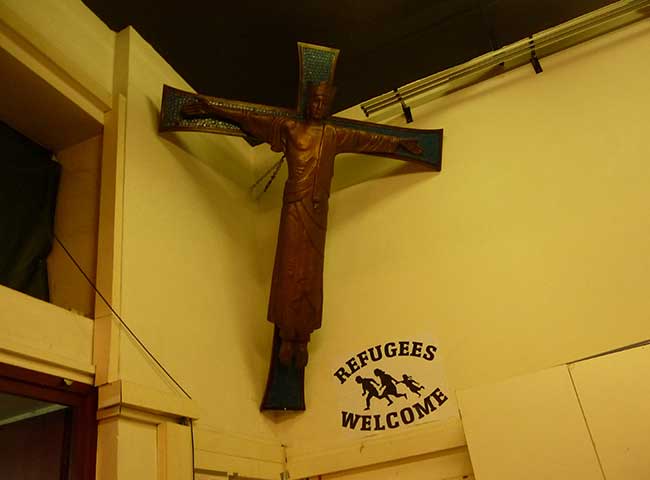Over the past several weeks, the RCA has supported mission partners and co-workers as they work with refugees across Europe and the Middle East. Carolyn Otterness, who serves with her husband in partnership with the Reformed Church in Hungary, has seen the fruit of this support.
Over the past several weeks, the RCA has supported mission partners and co-workers as they work with refugees across Europe and the Middle East.
Just now, RCA mission coworker JJ TenClay is with Waldensian colleagues visiting other refugees on the island of Lampedusa.
Carolyn Otterness, who serves with her husband in partnership with the Reformed Church in Hungary, has seen the fruit of this support.
Carolyn recently visited two sites in Austria that are aiding refugees seeking asylum. These two sites are run by a Roman Catholic diocese in the Vienna area. Austria, traditionally, is Roman Catholic, with a near 75% of the population being Catholic in the 2001 census, and Lutherans being the largest Protestant denomination at almost 5% in the same census.
Carolyn writes:
When our train arrived in Vienna, many refugees were waiting in the station for a train to take them somewhere. Because of the overwhelming numbers of refugees, some countries prohibit international train crossings. Many refugees end up walking into Austria.
When I visited Austria, Father Hans Huetter, a priest in Vienna, took me to two refugee projects to which the RCA gave support.
First he took me to Eggenburg. Just over a week ago, a church there began welcoming young men under 18 who arrive alone to Austria as refugees. The young men come primarily from Syria and Afghanistan.
The church houses the young men in an old school, where they learn to speak German, acquire job skills, and become integrated into the community around them.
While I was there, I saw one young man who looked very sad and distant. He did not try to communicate with us or even look at us. Another appeared very happy. He spoke a bit of English, offered us tea, and was constantly drawing trees and flowers.
This place is beautiful and very peaceful. These young men are extremely fortunate because the town is very eager to welcome them and help them, and the grounds and building of their new home are so lovely. Some refugees are housed in cold, cramped, and crowded spaces, with inadequate toilets and little privacy. In comparison, this old school in Eggenburg looks like heaven.
Then Father Hans Huetter took me to an overnight shelter in a church in Vienna. I saw exhaustion on the faces of the refugees as they entered the shelter, but they were obviously very happy and relieved to be there. They receive a mattress and sheet to sleep on, and then they are given dinner. A medical team is on hand to offer simple care and evaluation.
The refugees stay in two large rooms, one for men and boys, and another for women, girls, and young children. The church has had over 200 refugees each night for the past few nights, which is too many for the toilet facilities they have, so some of the refugees are being bussed to a different shelter. Still, the people at the church are dedicated to this shelter, volunteering their time and talents.
Unlike Austria, Hungary, where we serve, is not welcoming to refugees. Hungarian authorities and laws seem to change every week, but the message to the refugees is very clear: “Do not enter Hungary illegally or you will go to prison. We will make it very difficult for you to stay here.” This article offers more information about Hungary’s position.
The flow of refugees going to Western Europe through Budapest has virtually stopped. In the meantime, the refugee mission in Hungary is re-strategizing and planning for the integration of refugees and for the support they will need over the long term. The numbers of refugees claiming asylum in Hungary will increase, while the refugee mission has decreased both in staff size and in financial support.
Most people recognize that refugees are human beings who have left their homeland for reasons of fear, hopelessness, misery, and death. Too many people, though, fear that immigrants will cause destruction of a familiar way of life, that Hungary will become Muslim, or that terrorists will hide among the refugees.
This is a time for the whole world, not just Europe, to grapple with how to handle the needs of people who are seeking hope, security, freedom, and opportunities that they cannot find in their own homeland. This refugee crisis may well be the defining issue of this century. Jesus tells us to feed the hungry, visit the prisoner, welcome the alien, help care for the widows and orphans, and clothe the naked. How we do this is dependent on laws, efforts of citizens, civil discussions, and listening to those who are seeking refuge.
Please pray for the refugees who are traveling, seeking refuge, seeking hope, and seeking safety. Pray for the people working so hard to offer a little bit of hope and comfort along the way. Pray for those who have to make difficult decisions and make laws. Pray for your own churches and communities as you talk about ways you can help. Don’t just talk about sending money; give. You can give through the RCA. But don’t just give; also look at ways that your own church can offer hope and help to the refugees and immigrants that live in your community.
Thank you for your interest, your prayers, and your financial support towards these projects that help the refugees and refugee missions.
For more information on the refugee crisis, see the Otternesses’ recent newsletter.





